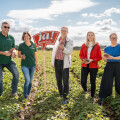Organic on the rise
Organic products continue to grow in Austria, confirms the management of Ja! Natürlich. Organic sales at BILLA are growing more than twice as fast as conventional products. Since the second quarter of 2024, organic products have been growing faster than conventional products in the Austrian food retail sector. ‘This shows that people in Austria are not only remaining loyal to organic products, but that the importance of organic products continues to grow. Within 10 years, the share of organic products in the Austrian food retail sector has risen from 7.5% to 11.1%, an increase of almost 50%,’ says the management of Ja! Natürlich. At BILLA and BILLA PLUS, the organic share is even higher.
Healthy soil as the basis of life
‘90 per cent of our food comes from the soil – its health is therefore the basis of our food security,’ emphasises Klaudia Atzmüller, Managing Director of Ja! Natürlich, at a media event at the Michaeler organic farm in Marchegg. The importance of this is particularly evident in the face of natural disasters: the floods of September 2024 caused damage amounting to around 1.3 billion euros in Austria – a significant proportion of which was in agriculture. ‘When soils are healthy – rich in humus, biologically active and with a stable structure – they can absorb and store water much better. This means they actively help to reduce flood risks and supply the soil with moisture for longer during dry periods,’ says Atzmüller. For years, Ja! Natürlich has been taking measures to raise public awareness of soil health and diversity. ‘We see it as our responsibility to raise awareness of this issue, because without healthy soils there is no future fit for our grandchildren, and they are therefore one of our most valuable resources,’ Atzmüller is convinced.
Michaeler Organic Farm: Diversity in the fields and in the soil
Host Gerhard Michaeler presented his farm, which has been supplying Ja! Natürlich with fresh organic vegetables for over 20 years. ‘Our diversity ranges from lettuce to root vegetables to sweet potatoes,’ summarises the committed organic farmer. ‘Diversity in cultivation also means diversity in soil life – earthworms, microorganisms and insects ensure the stability of our soils.’ Despite increasing weather extremes and market pressure, this approach enables stable yields, high quality and resilient crops to be achieved.
Diversity as a recipe for success
‘Different soils mean different challenges. But that is precisely where the strength of organic farming lies,’ explains Andreas Steidl, managing director of Ja! Natürlich.
Organic farmers work in a cycle without synthetic aids. Diversity is the key here: crop rotation, green manure and the cultivation of alfalfa instead of monocultures. "By avoiding chemical fertilisers and other artificial corrective measures, local organic farmers are forced to take special care of their soil and find solutions to protect it. With our Ja! Natürlich farmers, it is therefore particularly important to us to close the organic cycle as far as possible. Specially designed crop rotations are crucial for humus formation and thus for healthy, fertile soil and securing harvests and a reliable supply – in other words, they are essential for all of our futures," explains Ja! Natürlich Managing Director Andreas Steidl, describing how his long-standing suppliers ensure high-yield harvests even in difficult years.
From field to plate: bringing diversity to life
But diversity plays a crucial role not only in the field – the human organism also needs healthy variety. This is what cookbook author and culinary journalist Katharina Seiser stands for with her latest bestseller, ‘30 Plants per Week’. Seiser has been an organic fan from the very beginning and has been closely associated with Ja! Natürlich for many years.
"It's nothing new that plant diversity tastes good. But microbiome research is increasingly showing that many different plants – vegetables, fruits, herbs, whole grains, legumes, nuts, seeds and ferments – actually keep us healthy and in a good mood. My motto is therefore “more of the good stuff”, and “30 plants a week” makes that easy and enjoyable," says Katharina Seiser.













